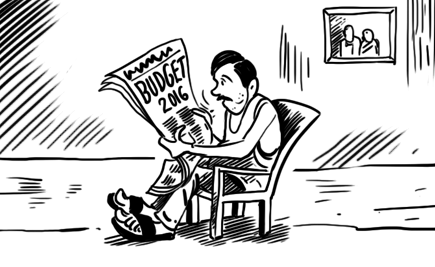
Design credits: Vishnu Madhav A.
With the annual budget just around the corner, there are strong expectations of the Finance Minister. From corporate bigwigs to businessmen and salaried individuals, everyone is looking for tax relief measures that can make the taxpayer’s life easier. Here are some measures that are likely to be on the budget wishlist for the common man and may see light of the day come February 29th.
Additional reading: Union Budget 2016 Expectations: A Startup Perspective
1: More tax deduction on interest on home loan:
If you purchase property through the home loan mode, you get a tax deduction of up to Rs 2 lakh for the interest paid, if the loan is for a self-occupied property. However, if the loan is for a house under construction, and if the construction gets delayed for over 3 years, this deduction drops down to Rs. 30,000. Given that project delays are common in the Indian real estate sector, many borrowers end up paying huge pre-EMI with no or little tax benefits. It is expected of the Finance Ministry to either increase this limit of Rs. 30,000 or remove the cap altogether for interest payment, so that buyers do not get a raw deal for project delays.
2: Realistic HRA exemptions:
Another front that needs a more rational reform is the House Rent Allowance, or HRA. HRA exemption is calculated depending on the city one is located in. If you live in a metro city, you get an exemption of the least of rent paid minus 10% of your basic salary, actual rent paid, and 50% of basic pay. The percentage of basic pay goes down to 40% if you live in a non-metro city. With rental prices in all tier-1 non-metro cities like Pune, Hyderabad, Bengaluru, Gurgaon etc on the rise, the limit of 40% of basic pay ought to be extended and brought on par with that for the metro cities. An announcement for such realistic HRA exemptions is likely to enthuse many salaried employees living in non-metro cities.
3: More tax-friendly pension schemes:
India is still a nation where the majority of people do not give due importance to pension planning. The reason, partially, is the lack of attractive tax sops for pension-linked products. Even the National Pension Scheme, which the government aims to promote, comes with a tax component when it comes to returns. NPS is primarily built as EET (or Exempt, Exempt, Tax) scheme which makes it less attractive with the final corpus being taxable. Other retirement benefit schemes like EPF and PPF allow tax-free withdrawals while NPS and pension funds have a taxable component. The common man’s budget expectations include exemption of pension products from the tax sword on withdrawal. This move can aid pension investments in India.
4: Reduction in service tax on insurance premium:
Every service you avail within the country gets tagged with service tax. The addition of a Swacch Bharat cess last year made service tax climb to a high of 14.5%. If you buy an insurance policy, an additional 14.5% of the premium is paid out as service tax, thereby increasing the overall premium towards insurance. In a scenario where the government is trying to promote the insurance sector, there are calls to reduce service tax on insurance products. If the government reduces or completely removes the component of service tax on life and non-life insurance premium, it will make premiums less costlier and give a huge boost to the insurance sector. A reduction of service tax for insurance premiums will be a win-win situation for the government, the common man, as well as the insurance companies.
5: Elimination of multiple taxes on real estate:
While the government has brought in many reforms to advance sales in the real estate market, including the affordable housing sector, buying a home is still a costly affair. As a buyer, even if you get a home loan, you still need to pay too many taxes and fees from your own pocket. Payment of service tax, value added tax, stamp duty, and registration charges—all add up to substantial amount.
While the introduction of GST can bring in relief, there is a definite case for bringing down stamp duty and registration costs especially for affordable housing. Stamp duty and registration charges surge to as high as 9% in some states, which not only increase the cost of ownership, but also place an undue financial stress on the common man.
With the Union Budget 2016 just a few days away, the expectations from the Finance Minister are real and palpable. Some of these measures, if brought to force on the 29th of February, can usher in the ‘Acche Din’ in the real sense
Additional reading: Highlights of the Union Budget 2016-17
